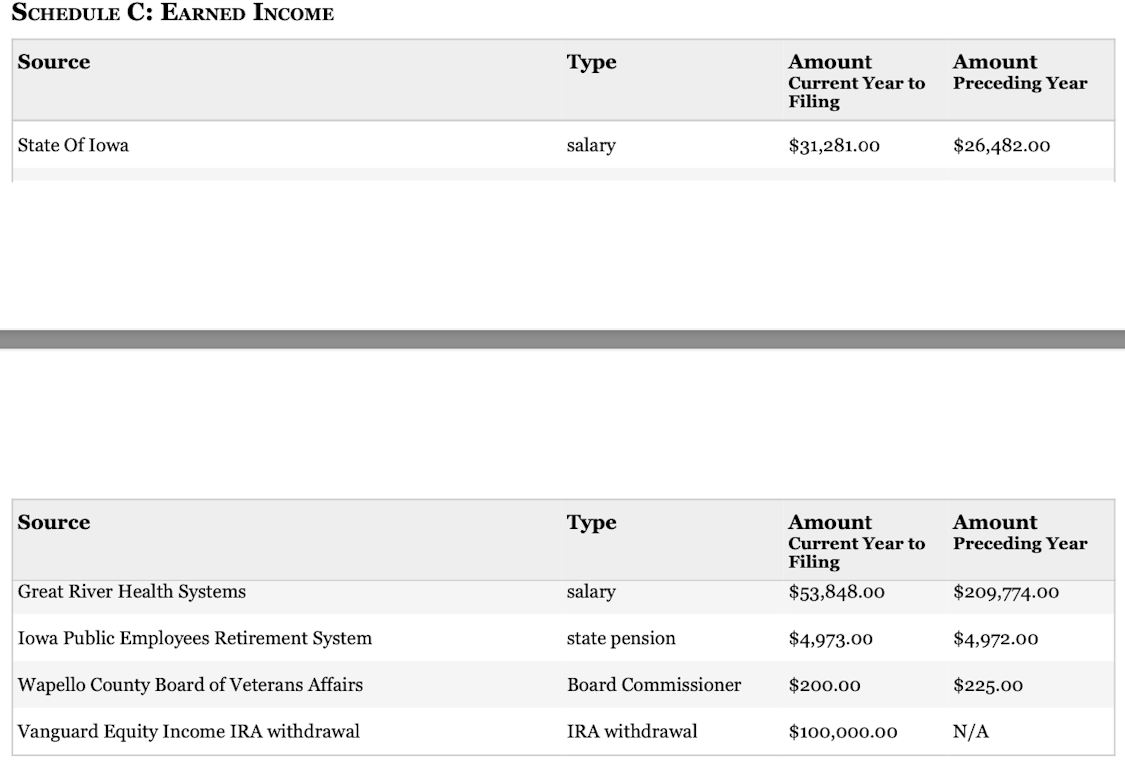U.S. Representative Mariannette Miller-Meeks (IA-02) has revised the financial disclosure forms Congressional candidates and members of Congress must submit annually. The new documents mention more than 50 assets, liabilities, or income sources not listed on the 2020 annual report Miller-Meeks submitted in August. The apparent omissions prompted the Iowa Democratic Party’s executive director to file an ethics complaint last month against the first-term Republican.
Despite working with the House Ethics Committee to fix the problems, Miller-Meeks’ latest filings don’t entirely line up.
INCONSISTENCIES IN INCOME REPORTED
The amended candidate report for 2020 is dated October 23 and covers the period from January 1, 2019 to May 15, 2020.
The amended annual report for 2020 is dated October 28 and covers the period from January 1, 2020 to August 14, 2021.
Both reports list the same investment or retirement account holdings (about four dozen of them) under “Schedule A: Assets and ‘Unearned’ Income.” None of those were mentioned on the first version of Miller-Meeks’ annual report.
Things get puzzling on “Schedule C: Earned Income.” Both reports have separate columns for “current year to filing” and “preceding year.” I would expect “current year to filing” to reflect 2020 income on the candidate report and 2021 numbers on the annual report. Similarly, I would expect “preceding year” to cover 2019 on the candidate report and 2020 on the annual report.
That’s not how it goes. Here’s the income portion on Miller-Meeks’ revised annual report for 2020 (the dark gray line is a page break).
Here’s the same section of the revised candidate report for 2020 (no page break here).
Miller-Meeks’ income from the state of Iowa is identical on both filings. But she stopped collecting her salary as a member of the Iowa Senate this year. So the annual report (on which “current year to filing” should mean 2021) should not have any income from the state. It should list that $31,281 from 2020 as income from the preceding year.
Both reports show the same amount of income from the Great River Health Systems. If Miller-Meeks received $53,848 from them in 2020 and $209,774 in 2019, that would be allowed. But collecting nearly $54,000 in 2021 would raise other concerns.
Tom Barton reported for the Quad-City Times on November 16,
[Spokesperson Will] Kiley did not respond to emailed questions asking to clarify for which years Miller-Meeks was reporting earned income. For example, she listed nearly $210,000 in salary from her Great River Health System for the “preceding year” and nearly $54,000 in salary from her previous employer for the “current year.” She also listed receiving her $31,000 annual Iowa Senate salary for the “current year,” despite resigning the seat to join Congress in January of this year.
All told, Miller-Meeks appeared to receive more than $31,000 in qualified outside income in 2021, which would violate a House ethics rules prohibiting members of Congress from earning outside income above a set threshold. For the 2021 calendar year, the income cap for members is $29,595.
Perhaps none of these “current year” numbers refer to 2021 income. Supporting that conclusion: there is no mention of the Congressional salary Miller-Meeks has been collecting since January.
So let’s assume that on both reports, “current year to filing” means 2020 and “preceding year” means 2019. What is going on with Miller-Meeks’ state pension? She reported the same “preceding year” income from IPERS on both forms, but different current-year pension numbers. Similarly, the small income Miller-Meeks received for serving on a Wapello County board isn’t consistent on the annual and candidate filings.
Adding to the confusion, Miller-Meeks listed a $100,000 IRA withdrawal on her amended annual report for 2020 but not on the amended candidate report. Maybe that withdrawal is where she got the $100,000 in “personal funds” she loaned to her Congressional campaign in October 2020, according to Federal Election Commission filings. Whatever it is, if that income belongs on Schedule C on the annual report, it should be there on the candidate report.
Kiley told Barton, “There was a simple misunderstanding with regards to what was required to be disclosed” as income. Fair enough—but if the misunderstanding has been cleared up, why do the revised reports not report the same earned income?
HOME NOT LISTED AS LIABILITY ON CANDIDATE REPORT
Neither Miller-Meeks’ candidate report from May 2020 nor her annual report from August of this year listed any liabilities. Bleeding Heartland noted in September that if Miller-Meeks and her husband owe any money on a home mortgage, that should be listed as a liability.
The revised annual report now lists one liability: a mortgage on a personal residence in Ottumwa, incurred in 2010, owed to Iowa State Bank, and valued between $250,000 and $500,000. However, the latest version of the candidate report still lists no liabilities.
I doubt that omission was intentional; Miller-Meeks would have nothing to gain from hiding her home mortgage. What I don’t understand is how a member of Congress and her staff could fail to make sure every detail was accurate on the revised forms, after knowing about the disclosure problems for weeks. All of this should have been resolved before the Iowa Democratic Party managed to file its ethics complaint.
Iowa Republicans accused Democratic Representative Cindy Axne (IA-03) of “corrupt” and “criminal” behavior because she didn’t realize she needed to report stock trades that she didn’t direct. But Axne fixed those errors promptly after a watchdog group highlighted the problem in an ethics complaint.
In contrast, Miller-Meeks may have to file yet another set of amended reports to address the discrepancies in the ones she submitted in late October. I wouldn’t call that “corrupt” or “criminal,” but it sure looks incompetent.



